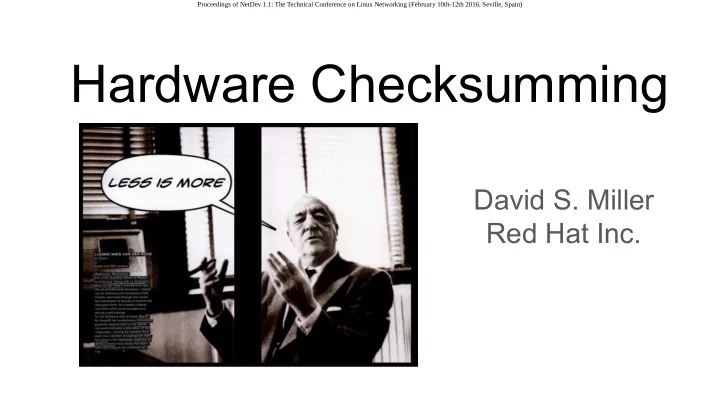

Proceedings of NetDev 1.1: The Technical Conference on Linux Networking (February 10th-12th 2016. Seville, Spain) Hardware Checksumming David S. Miller Red Hat Inc.
Proceedings of NetDev 1.1: The Technical Conference on Linux Networking (February 10th-12th 2016. Seville, Spain)
Proceedings of NetDev 1.1: The Technical Conference on Linux Networking (February 10th-12th 2016. Seville, Spain) Overview ● Internet checksumming basics ● Hardware History ● Tunneling and Encapsulation ● Arguments for a ubiquitous 1’s complement checksum
Proceedings of NetDev 1.1: The Technical Conference on Linux Networking (February 10th-12th 2016. Seville, Spain) Internet Checksumming Basics 1. 16-bit 1’s complement sum 2. Computed with checksum field of header set to zero 3. For protocols (UDP, TCP, etc.) ‘pseudo header’ is included 4. Many arithmetic tricks exist to speed up calculation a. Add with carry instructions b. Folding
Proceedings of NetDev 1.1: The Technical Conference on Linux Networking (February 10th-12th 2016. Seville, Spain) Hardware History: Part 1 Dumb stateless devices, no hardware checksumming offload. Ring buffers, if you were lucky. Checksumming “for free” with checksum+copy operations. Trivial for send, less trivial but doable for receive (run the TCP stack in recvmsg() control flow).
Proceedings of NetDev 1.1: The Technical Conference on Linux Networking (February 10th-12th 2016. Seville, Spain) Hardware History: Part 2 Scatter-gather and checksumming offloads, but “stateful” . On receive it only gives a boolean state, saying whether the checksum is good or bad. Limited to protocol headers the parser engine understands. New protocol or tunnel encapsulation? New hardware. Not extensible. (... time in place solution …)
Proceedings of NetDev 1.1: The Technical Conference on Linux Networking (February 10th-12th 2016. Seville, Spain) Hardware History: Part 2.1 Chip provides 1’s complement sum computed over entire RX packet contents. Stack can cheaply adjust this sum as it pulls headers. Works for arbitrary tunneling technologies and layering. On TX, chip is told the point at which to start computing the checksum, and where to place the 16-bit result. Checksum field is pre-seeded with pseudo header checksum.
Proceedings of NetDev 1.1: The Technical Conference on Linux Networking (February 10th-12th 2016. Seville, Spain) Tunneling and Encapsulation 1. Multiple checksums 2. Which one, if any, to offload? 3. In the presence of multiple checksums, what does skb- >csum_start and skb->csum_offset get set to? 4. Ironically, we don’t actually need support for offloading multiple checksums.
Proceedings of NetDev 1.1: The Technical Conference on Linux Networking (February 10th-12th 2016. Seville, Spain) Tunneling Part 2 Edward Cree’s observation “local checksum offload” : Outer checksum does not depend upon full payload. Why? 1’s complement sum is weak, don’t make it weaker. On fwd encapsulation we checksum full outer packet.
Proceedings of NetDev 1.1: The Technical Conference on Linux Networking (February 10th-12th 2016. Seville, Spain) Tunneling Part 3: Remote Checksum Offload From Tom Herbert, must be supported by both ends Metadata describes how to deduce the inner checksum Only the outer checksum is performed on transmit Receiver validates outer checksum, decapsulates, then uses the metadata to deal with inner checksum. Mostly obviated by local checksum offload, but not completely.
Proceedings of NetDev 1.1: The Technical Conference on Linux Networking (February 10th-12th 2016. Seville, Spain) Protocol Ossification Too finely focused hardware offloads have a terrible side- effect Several aspects of the internet become set in stone If it’s not UDP or TCP, the facility is unusable Hence proliferation of ‘foo-over-UDP’ tunneling technologies and ideas which will destroy the internet, such as those involving using TCP for tunnel encapsulation
Proceedings of NetDev 1.1: The Technical Conference on Linux Networking (February 10th-12th 2016. Seville, Spain) 1’s Complement CSUM Everywhere 1. Less complex logic in chipsets. 2. More consistent feature sets and performance 3. The kernel becomes simpler 4. Supporting new “stuff” is easier, less ossification 5. In large to huge data centers, the lowest common denominator is what matters. Message to hardware designers: Raw 1’s complement offloads are what we want
Proceedings of NetDev 1.1: The Technical Conference on Linux Networking (February 10th-12th 2016. Seville, Spain) Checksum Conclusions The kernel’s needs are simple and minimal. Sophisticated hardware checksum facilities have little to no value at all In fact, they get in the way Raw 1’s complement facilities allow us to support anything
Proceedings of NetDev 1.1: The Technical Conference on Linux Networking (February 10th-12th 2016. Seville, Spain)
Proceedings of NetDev 1.1: The Technical Conference on Linux Networking (February 10th-12th 2016. Seville, Spain) The State of Switchdev “And in advance, I’d like to thank the first hardware vendor to merge hw switching driver upstream. You will be a true trail- blazer.” -Ottawa 2015 Thanks to Mellanox, someone answered the call. Tell your hardware vendor that SWITCHDEV based Linux solutions are what you want from them!
Proceedings of NetDev 1.1: The Technical Conference on Linux Networking (February 10th-12th 2016. Seville, Spain) Thanks Pablo Neira Ayuso and the whole netdevconf team Tom Herbert for beating the checksumming drum for the past few years Hardware driver maintainers for listening and giving feedback
Recommend
More recommend